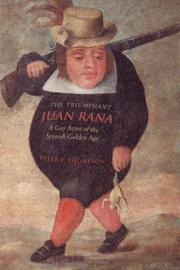| Listing 1 - 3 of 3 |
Sort by
|
Book
ISBN: 1442621400 1459341694 0802093639 Year: 2009 Publisher: Toronto, [Ontario] ; Buffalo, [New York] ; London, [England] : University of Toronto Press,
Abstract | Keywords | Export | Availability | Bookmark
 Loading...
Loading...Choose an application
- Reference Manager
- EndNote
- RefWorks (Direct export to RefWorks)
"Juan Rana, the most famous actor of the Spanish Golden Age, enjoyed a long and successful career from 1617 to 1672. Over fifty entremeses - interludes featured between the main acts of full-length plays - were written especially for him by some of the most important playwrights of the period. This bilingual and annotated edition of The Outrageous Juan Rana Entremeses translates a selection of the entremeses for the first time, highlighting their literary complexity and providing historical context for the many double meanings and innuendos they contain." "Rana's arrest for homosexuality in 1636 led him to play more gender bending, transvestite, and implicitly sexual roles. Many of his roles parody marriage, patriarchy, and heterocentric values while wrestling with issues of gender, sexual, and biological identity. As Peter E. Thompson ably demonstrates, these interludes challenge preconceived notions about society during the Spanish Golden Age by dealing with subject matter that remains extraordinarily relevant today."--Publisher.
Entremés. --- Spanish drama (Comedy) --- Spanish drama --- Entremés --- Rana, Juan --- Performances.
Multi
ISBN: 9781442621404 9780802093639 1442621400 9781459341692 1459341694 0802093639 Year: 2009 Publisher: Toronto, [Ontario] ; Buffalo, [New York] ; London, [England] : University of Toronto Press,
Abstract | Keywords | Export | Availability | Bookmark
 Loading...
Loading...Choose an application
- Reference Manager
- EndNote
- RefWorks (Direct export to RefWorks)
"Juan Rana, the most famous actor of the Spanish Golden Age, enjoyed a long and successful career from 1617 to 1672. Over fifty entremeses - interludes featured between the main acts of full-length plays - were written especially for him by some of the most important playwrights of the period. This bilingual and annotated edition of The Outrageous Juan Rana Entremeses translates a selection of the entremeses for the first time, highlighting their literary complexity and providing historical context for the many double meanings and innuendos they contain." "Rana's arrest for homosexuality in 1636 led him to play more gender bending, transvestite, and implicitly sexual roles. Many of his roles parody marriage, patriarchy, and heterocentric values while wrestling with issues of gender, sexual, and biological identity. As Peter E. Thompson ably demonstrates, these interludes challenge preconceived notions about society during the Spanish Golden Age by dealing with subject matter that remains extraordinarily relevant today."--Publisher.
Theatrical science --- Entremés. --- Spanish drama (Comedy) --- Spanish drama --- Entremés --- Rana, Juan --- Performances.

ISBN: 1281992704 9786611992705 1442682450 9781442682450 9781281992703 9780802089694 0802089690 0802034527 Year: 2006 Publisher: Toronto, [Ontario] ; Buffalo, [New York] ; London, [England] : University of Toronto Press,
Abstract | Keywords | Export | Availability | Bookmark
 Loading...
Loading...Choose an application
- Reference Manager
- EndNote
- RefWorks (Direct export to RefWorks)
Juan Rana was the most famous buffoon of his time. An actor working during the years 1617-1672, he achieved a status similar to that of the Italian Harlequin and was a favourite of the ruling monarchy and the general populace. Over fifty short plays were written especially for Rana by some of the most important playwrights of the day, including Pedro Calderón de la Barca, who crowned Rana the most famous gracioso of the baroque era. Juan Rana was arrested in 1636 for the 'nefarious sin' of homosexuality and thereafter played more gender bending, transvestite, and homosexual roles. Many of his roles wrestle with issues of gender, sexual, and biological difference but, surprisingly, little work has been done on the important issue of his sexuality. In The Triumphant Juan Rana, Peter E. Thompson examines the actor's sexuality both on and off the stage and demonstrates that his homosexuality was tolerated, even understood and applauded, by the public. Thompson challenges many preconceived ideas about the Spanish Golden Age and fills an existing void in queer studies of this important period in European theatrical and literary history.
Actors --- Gay actors --- Rana, Juan. --- Theatrical science --- Rana, Juan --- Spain. --- Espagne --- Espainiako Erresuma --- España --- Espanha --- Espanja --- Espanya --- Estado Español --- Hispania --- Hiszpania --- Isupania --- Kingdom of Spain --- Regne d'Espanya --- Reiaume d'Espanha --- Reino de España --- Reino d'Espanya --- Reinu d'España --- Sefarad --- Sepharad --- Shpanie --- Shpanye --- Spanien --- Spanish State --- Supein
| Listing 1 - 3 of 3 |
Sort by
|

 Search
Search Feedback
Feedback About UniCat
About UniCat  Help
Help News
News